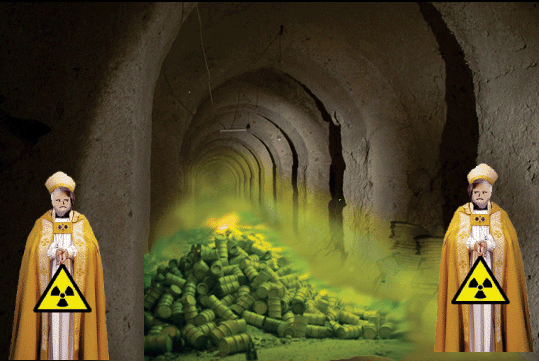
Happy Tuesday. Cyborg monkeys, Atomic Priesthoods – this edition does feel like something out of a terrible Hollywood Blockbuster.
In today’s edition:
🚘 Polestar announce the carbon neutral car
🤖 High-tech greenhouse + AI robots = Farm of the future
🔬 New technology allows X-rays for all

The first carbon neutral car by 2030
We’ve highlighted before that the automotive industry’s next big net-zero hurdle will come from the production line rather than the exhaust. Last week, Swedish electric car innovator, Polestar, announced a “moonshot goal” of creating the “world’s first” truly climate neutral car by 2030. Automobile production, including the mining of rare earth minerals that go into lithium-ion batteries, is an intensely carbon-heavy process. Even reducing those emissions, never mind eliminating them, will be a huge undertaking.
Uniquely positioned: Polestar, as a boutique operation, may have more flexibility to achieve its goals than other larger — and less nimble — companies. Being a first mover may prove profitable, with proposed carbon taxes being levied against the industry.

LinkedIn’s hiring for the future
The Pandemic has caused record highs in long-term unemployment (2.8% of the US population) deepening inequality. LinkedIn wants to make the job market more accessible by helping the unemployed develop skills sought after by employers through:
- Reskilling Revolution Initiative: Launched in partnership with the World Economic Forum to upskill the unemployed so they can take advantage of the jobs created by the fourth industrial revolution.
- Skills Path: Which enrols applicants in courses to develop the required skills and guarantees a video interview, meaning a larger talent pool for employers to choose from for hard-to-fill roles.
There’s a commercial incentive for LinkedIn too, who charge employers to use some of the talent identification products, ultimately meaning more revenue for the platform.
The World Bank to aid the developing world’s climate fight
The World Bank announced a new ‘Climate Change Action Plan’ aimed at helping developing countries achieve measurable reductions in greenhouse gas emissions:
- 35% of World Bank financing will have climate co-benefits (up from 26%) a.k.a financing that supports climate action while tackling poverty and inequality
- Make ‘transformative’ investments to aid developing nations’ transition out of coal
- Align financing with the Goals of The Paris Agreement
🤖 Future of Tech (1-minute read)
High-tech greenhouse + AI robots = Farm of the future
AppHarvest, a high-tech greenhouse startup producing 30-times more crops than open-field farming with 90% less water, has acquired robotics company Root AI. (We’ve spoken previously about both companies). Root AI’s robots are experts in picking tomatos, having built up a huge dataset of tomato images since the company’s launch 3 years ago. By combining infrared lasers with cameras, the robots can identify tomatos at different stages of maturity and decide if they’re ready to be picked. AppHarvest is onboarding Root AI to improve the efficiency of its tomato harvest and ensure ongoing shipment to retailers like Walmart and Kruger.

X-rays for all
According to the World Health Organization (WHO), approximately 3-4 billion people are at risk of deaths that can be avoided if radiology were available. The ‘Global Radiology Gap’ is a critical issue – every part of healthcare, from monitoring pregnancies to cancer treatment, benefits from democratising medical imaging. Nanox, an Israeli startup has developed a new method to generate x-rays using a silicon chip (just approved by the FDA). The solution emits less radiation, costs a fraction of the price, and requires far less electricity – a big deal for off-grid communities. Processing costs are also slashed with cloud storage and diagnosis of images using artificial intelligence.
💡Start-up Spotlight (1-minute read)
The problem: Nuclear energy is key to nations’ transition away from fossil fuels. Producing nuclear energy creates radioactive waste, which remains active for upwards of 10,000 years, but as we know people like to dig stuff up…
Language barrier: You only have to look at the opening of Beowulf, written 1,000 years ago ‘Hwæt! We Gardena in geardagum’ to see language cannot withstand the timescale of nuclear decay. So how do we deter our descendants from nuclear waste sites?
Enter the Priesthood: Fortunately, the field of ‘Nuclear semiotics’ is dedicated to just that. One of the most outlandish concepts is ‘The Atomic Priesthood:
- A “priesthood” of nuclear experts would be initiated and would pass on their knowledge of nuclear waste sites when they retire;
- Annual rituals and legends would be created to warn off the ‘uninitiated’ from hazardous waste sites (To prevent waste being exploited by wrongdoers);
- Backup waste warning messages would be updated every few generations.
Strangely, the ‘cult’ like priesthood was never adopted. Currently the US is guarding their deposits for at least a 100 years until a more permanent solution is agreed upon.

Little Bytes
Quote: “Technology is developing at a rapid pace. The models created today can shape how we live and work for decades. Today’s leaders can scale more than just technology – they can scale a responsible approach to life in the digital age.” Jeremy Jurgens, Managing Director, World Economic Forum
Stat: Plant-based food sales hit $7 billion in the US during 2020 with retail sales of plant-based foods growing 27% year-on-year – Good Food Institute
Watch: Lights that stop unwanted fish getting caught in nets
🗞 In other news…
- Impossible Foods, the plant-based burger leader, is preparing for a $10 billion initial public offering
- Aldi set to donate 250,000 meals to children facing hunger over the Easter holidays
- Australians can now exchange solar energy credits for beer with blockchain
- Oatly is partnering with beverage company, Yeo, to build a new plant-based milk factory in Singapore
- UK Government launches the world’s largest ocean monitoring system
- France to ban short-haul domestic flights
🎣 Gone Phishing
Three of these stories are true, one we made up can you guess which?




